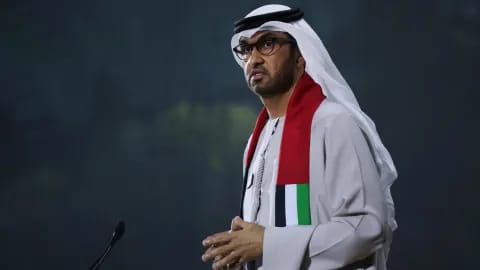Climate Change & Energy
COP 28: There’s ‘no science’ behind need to phase out fossil fuels -Climate summit leader
Source: Ghenvironment.com - December 4, 2023

Sultan Al Jaber, President of the COP28 climate summit, speaks at a presentation in Dubai on December 2, 2023.
The president of the COP28 climate summit, Sultan Al Jaber, recently claimed there is “no science” that says phasing out fossil fuels is necessary to limit global warming to 1.5 degrees Celsius above pre-industrial levels, in comments that have alarmed climate scientists and advocates.
The future role of fossil fuels is one of the most controversial issues countries are grappling with at the COP28 climate summit. While some are pushing for a “phase-out,” others are calling for the weaker language of a “phase-down.” Scientific reports have shown that fossil fuels must be rapidly slashed to keep global warming below 1.5 degrees — the goal of the Paris climate agreement, and a threshold above which scientists warn it will be more difficult for humans and ecosystems to adapt.
Al Jaber made the remarks during the She Changes Climate panel event on November 21, which came to light on Sunday in a story published by the Guardian, and in video that CNN has reviewed. Al Jaber was asked by Mary Robinson, former president of Ireland and current chair of the Elders Group, an independent group of global leaders, if he would lead on phasing out fossil fuels.
In his response, Al Jaber told Robinson, “there is no science out there, or no scenario out there, that says the phase-out of fossil fuel is what’s going to achieve 1.5.” He said he had expected to come to the She Changes Climate meeting to have a “sober and mature conversation” and was not “signing up to any discussion that is alarmist.”
He continued that the 1.5-degree goal was his “north star,” and a phase-down and phase-out of fossil fuel was “inevitable” but “we need to be real, serious and pragmatic about it.”
In an increasingly fractious series of responses to Robinson pushing him on the point, Al Jaber asked her “please, help me, show me a roadmap for a phase-out of fossil fuels that will allow for sustainable socio-economic development, unless you want to take the world back into caves.”
Al Jaber’s presidency of the COP28 summit has been controversial. The Emirati businessman is the UAE’s climate envoy and chairs the board of directors of its renewables company, but he also heads the state-owned Abu Dhabi National Oil Company (ADNOC).
Al Jaber addressed his remarks in a surprise news conference Monday, in which he strongly defended his commitment to climate science.
“I have always been very clear on the fact that we are making sure that everything we do is centered around the science,” Al Jaber told reporters.
“I honestly think there is some confusion out there, and misrepresentation and misinterpretation,” he told reporters, adding, “I have said over and over that the phase down and the phase out of fossil fuel is inevitable. In fact, it is essential … it needs to be orderly, fair, just and responsible.”
A spokesperson for the COP28 team told CNN in a statement on Sunday “this story is just another attempt to undermine the Presidency’s agenda, which has been clear and transparent and backed by tangible achievements by the COP President and his team.”
“The COP President is clear that phasing down and out of fossil fuels is inevitable and that we must keep 1.5C within reach,” adding, “we are excited with the progress we have made so far and for the delivery of an ambitious (global stocktake) decision. Attempts to undermine this will not soften our resolve.”
Fossil fuels are the main driver of the climate crisis and as the world continues to burn oil, coal and gas, global temperatures are soaring to unprecedented levels. This year has seen record global heat, which has driven deadly extreme weather events.
Fossil fuel production in 2030 is expected to be more than double what would be necessary to keep global warming under 1.5 degrees, a recent report from several scientific institutions, including the UN Environment Programme, found. That report used scenarios laid out by the Intergovernmental Panel on Climate Change (IPCC) and the International Energy Agency (IEA) to reach its conclusion.
 Sultan Al Jaber, President of the COP28 climate summit, speaks at a presentation in Dubai on December 2, 2023.
Sultan Al Jaber, President of the COP28 climate summit, speaks at a presentation in Dubai on December 2, 2023.


